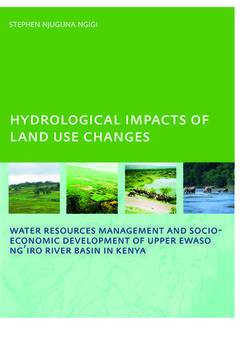Description
Hydrological Impacts of Land Use Changes on Water Resources Management and Socio-Economic Development ofthe Upper Ewaso Ng'iro River Basin in Kenya
PhD: UNESCO-IHE Institute, Delft
Author: Ngigi Stephen Njuguna
Language: English
Subjects for Hydrological Impacts of Land Use Changes on Water...:
80.97 €
Subject to availability at the publisher.
Add to cart
Hydrological Impacts of Land Use Changes on Water Resources Management and Socio-Economic Development ofthe Upper Ewaso Ng'iro River Basin in Kenya
Publication date: 11-2006
Support: Print on demand
Publication date: 11-2006
Support: Print on demand
Hydrological Impacts of Land Use Changes on Water Resources Management and Socio-Economic Development ofthe Upper Ewaso Ng'iro River Basin in Kenya
Publication date: 11-2017
· 17.4x24.6 cm · Hardback
Publication date: 11-2017
· 17.4x24.6 cm · Hardback
Description
/li>Contents
/li>Readership
/li>Biography
/li>
Despite the apparently desperate situation of sub-Saharan Africa, rainwater harvesting and management is a viable intervention for upgrading rain-fed agriculture, improving water supply and sustainable livelihoods in water-scarce river basins. If strategies are developed to ensure equity allocation of basin water, a win-win situation for diverse water users can be achieved. This thesis assesses the hydrological impacts of land use changes on water resources management and socio-economic development of the upper Ewaso Ng iro river basin in Kenya. It considers the impact of irrigation on dry season river flows and highlights the challenge of flood storage strategies. While flood storage can reduce dry season irrigation water abstractions by more than a half, without affecting hydro-ecological functions downstream, unplanned flood harvesting may impact negatively on flood flow, being detrimental to natural ecosystems and groundwater downstream.
1. Introduction 2. Research Background and Study Area 3. Conceptual and Analytical Framework 4. Agro-hydrological Assessment of On-farm Storage RHM Systems 5. Agro-Hydrological Assessment of In-Situ RHM Systems 6. Hydro-Economic Analysis and Farmers’ Investment Options 7. Flood Storage and River Water Abstraction 8. Conclusions and Recommendations
Postgraduate and Undergraduate
Stephen Njuguna Ngigi
© 2024 LAVOISIER S.A.S.




